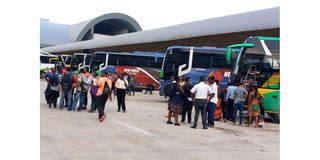Prime
Tanzanian Bus owners decry 'harsh' anti-drugs, immigration laws, push for reforms

Buses at the Magufuli Bus Terminal in Dar es salaam. PHOTO | FILE
What you need to know:
- Bus owners are especially concerned about these laws because they compel that they (bus owners) be held liable for illegal items such as narcotics, marijuana, or hazardous substances that may be transported by passengers
Dar es Salaam. Tanzania’s bus owners have called for urgent reforms to what they describe as outdated and punitive laws that hold them accountable for offences committed by passengers, even in cases where they have no knowledge or control over the actions.
The Tanzania Bus Owners Association (Taboa) has engaged with government officials, particularly from the Ministry of Transport, to push for amendments to laws that they argue unfairly burden service providers.
The laws in question include the Tanzania Drug Control and Enforcement Act, 2015 and the Immigration Act.
Bus owners are especially concerned about these laws because they compel that they (bus owners) be held liable for illegal items such as narcotics, marijuana, or hazardous substances that may be transported by passengers.
Under current legislation, bus owners face legal consequences if illicit goods are discovered on their vehicles, regardless of whether the items were booked officially or smuggled in by passengers without detection.
"This is unjust," said Taboa’s national secretary, Joseph Priscus, during an interview with The Citizen.
"Conductors do not have the authority or equipment to inspect passengers’ luggage, yet owners are punished for every item on board. To avoid such inconveniences in the transport business, it would be better to introduce scanners at terminals."
In a swift response, the Commissioner General of the Drug Control and Enforcement Authority (DCEA), Mr Aretas Lyimo, clarified that a vehicle would be confiscated only if it is proven to have been used to transport narcotics with the knowledge of both the driver and conductor.
However, if a passenger is found in possession of drugs, it is the individual passenger who will face legal action.
“If a passenger is found with narcotics in a transport vehicle, the passenger will be held responsible while the conductor and driver will serve as witnesses and provide statements to confirm that the passenger boarded the vehicle. This will not involve confiscation of the vehicle.
“If it is established that the vehicle itself was used to transport narcotics without a passenger present, then action will be taken against the vehicle and the transporters. That is why we stress the importance of being vigilant with drivers and conductors employed,” he explained.
However Taboa maintains that owners should only be held accountable for parcels booked through official procedures, not for personal items carried by passengers.
Compounding the problem, most long-distance buses are not equipped with scanners or surveillance systems to identify dangerous or illegal items.
Drivers and conductors, the owners note, are not law enforcement officers, nor are they trained to manage such risks. Yet, they are expected to bear legal responsibility under current frameworks.
The Land Transport Regulatory Authority (Latra) officials weighed in, saying that the issues had already been submitted to the Criminal Justice Commission, with special emphasis on drug trafficking.
Latra's head of Public Relations and Communication, Mr Salum Pazzy, stressed that strict laws are necessary to curb the illegal drug trade.
“Service providers must ensure their staff are properly trained in cargo handling. The law will not protect anyone claiming ignorance,” he said.
“However, we are continuing to educate operators to help them conduct their business without facing unnecessary challenges.”
In addition to the legal burden, bus operators also cite bureaucratic delays from regulatory bodies such as the Tanzania Revenue Authority (TRA).
Vehicles, they say, are frequently detained for hours or even days over minor tax or documentation issues, resulting in significant financial losses and passenger dissatisfaction.
To address these challenges, bus owners are mobilising through Taboa to prepare formal proposals for legal reforms.
They want a clear legal distinction between what a passenger carries and what the operator is responsible for.
“There must be shared accountability,” Mr Priscus said.
“Owners should not carry the full legal burden for every passenger’s actions.”
Some owners are now considering investments in advanced security technologies, such as CCTV systems and modern baggage scanners, as part of efforts to boost transparency and protect themselves legally.
Others are focusing on training staff to enhance cargo inspection and monitor passenger behaviour more effectively.
“Our sector is essential to national mobility and economic growth,” Mr Priscus added.
“But without fair laws and supportive systems, we risk weakening one of the most vital public services in the country.”
Another contentious issue is the expectation for bus staff to verify the identities and nationalities of passengers. According to operators, drivers and conductors are not immigration officers and lack the capacity to perform such checks.
Nevertheless, when illegal immigrants are discovered onboard, it is the vehicle owner who is held liable.
A conductor, Riziki Mrema, shared his personal experience: “Sometimes passengers board with marijuana or illegal items without our knowledge. When police discover them, we’re the ones who get into trouble.”
As calls for reform grow louder, the sector is urging the government to work collaboratively with stakeholders to develop balanced legal frameworks that ensure both security and fairness.





